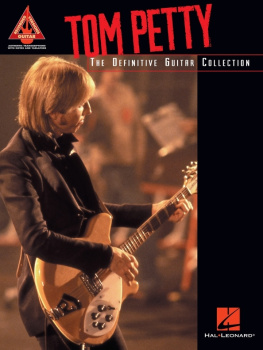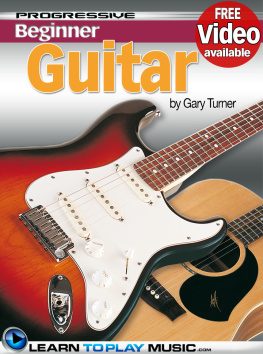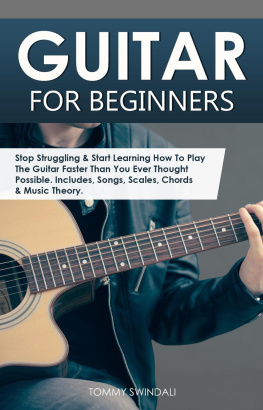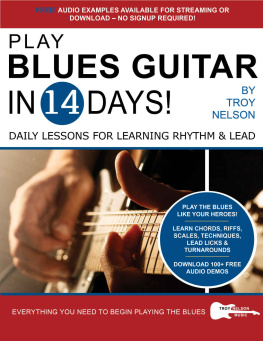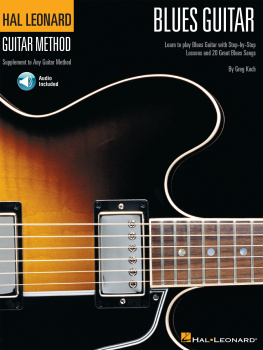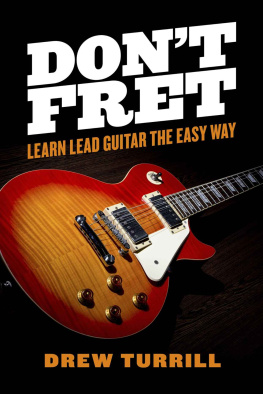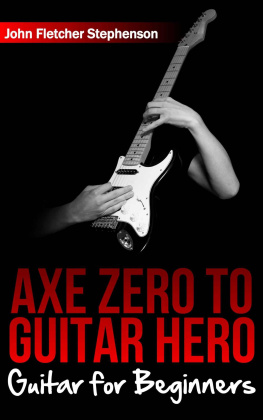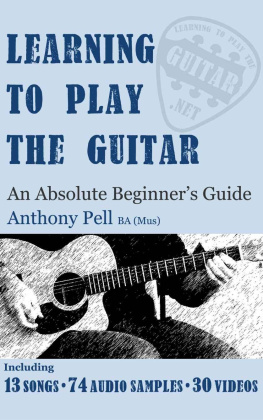Its not because there is any need for another lead guitar manual that I write this. There are plenty of them out there.
What seems to be needed is a more psychological approach to lead guitar.
There are plenty of technical books that will show you more licks than you can find here.
The attempt here is to approach lead guitar soloing with the idea that the mind goes through various stages of reacting to ones own playing.
The lead guitarist has to only balance and juggle notes around the groove to find that there is a certain responsibility to do whats right and let it go.
Problems arise when the player reacts too positively or too negatively to soloing. Given the positive, one becomes vain and conceited, while reacting negatively, one starts just playing poorly as if in a rut.
Learning Lead Guitar is a series of short epithets that bespeak of these internal problems.
There is also a Riff section and a play along section.
The student can start with the other sections and then browse the theory in any order.
If you want to physically dig in right away, then go to the .
I hope you find this book a helpful guide in Learning Lead Guitar.
Part I - Theory
1. The Rock Star Mentality Lose It!
It is obvious why you are here. You want to learn the magic secrets to that highly attractive dream of being a great lead guitarist.
That is going to be a problem
Because until you are willing to let that dream go, you are not going to learn anything.
You are not going to learn anything until you drop the attitude. Yeah, we all know how good you are and we are tired of hearing about it.
Stop trying to be a rock star
and start learning how to play lead guitar.
Treat your guitar learning well as if you were taking care of a plant that needs water and care daily. Ok, maybe not the best analogy, but you know what I mean: Approach Learning Leads as if you were learning classical music, lab work, or maybe even a job.
Dont sit there and glory in how fast you play, or imagine an audience applauding while you wave backGood Night New York!
This is about learning how to play lead guitar solos and not how to out-play any one or make a big production of speed, volume and theatrics.
This is about playing good solos that sound balanced and well executed.
Get it out of your head that you are going to be onstage impressing 50,000 teenagers.
Opening Your Ears
You can learn more if you keep listening.
Dont just listen to you, but listen to everyone else. What line is the bass repeating?
Is the drummer steady? What percentage of sound is your solo covering? Are you planning to lower your volume after the solo? Do you need to stay the same volume throughout?
If you are listening, you can instinctively work in certain choices.
Broadening Your Listening
I have 4 notes to you that I want you to listen to
B-A-C-H
[Yes, H was once a note]
Start with Bach and then listen to Charlie Parker.
Listen to Mozart Beethoven, Ravel, Stravinsky and Bartok.
Listen to Dixie Land, Swing, Bebop and Cool Jazz.
That would be Louis Armstrong, Lester Young, Coleman Hawkins,
Sonny Rollins, John Coltrane, Dexter Gordon and Cannonball Aderly.
And dont forget Sonny Stitt, Paul Desmond, Art Pepper and Phil Woods.
Can you imagine how many kinds of amazing soloists there are out there?
Listen to advice
There are an endless number of websites. Videos galore are available on you tube.
You can get plenty of advice; listen to it. It may not all be good. Take it in stride.
Teacher
One advantage to having a teacher is that you can learn many short cuts.
The other good thing is that you develop a sense of organizing and learning. this requires that you also develop a sense of responsibility.
In other words, you have to keep up every week with assignments.
Method Books
There are tons of method books that you can learn from, with or without a teacher.
Method books present material in an organized fashion and you can gauge your progress as you go.
Ask other Players
Do you see other guitarists play often? Then you have a chance to ask them what their approach is. You cant really say, how do you do that?, because often they dont know how they do it themselves.
2. Starting With Scales
I dont care how good you are at doing scales.
I just want to know if you can play a scale slowly.
How about 60 beats per minute? That is not too slow.
Have you ever tried spending time on a scale going only 40 beats per minute? Usually, when I ask someone to play a scale that slowly, they often make a mistake by the time they hit the third or fourth note.
Do scales every day and work them up to speed.
Use A Metronome.
Once you get them fastGO BACK to slow. Then and only then should you practice faster.
Above all --- DO NOT practice scales faster than you can honestly play them.
Nothing is worse than a show-off running fast scales in front of everyone.
Get it out of your head that you only play scales fast once you get them there.
Start them slow and even again and concentrate on producing a good tone.
AND oh yeah, You cant play leads if you dont know scales.
To know a scale is to be able to play it on demand at any tempo.
These scales are essential for learning how to solo:
Major - 1 st Configuration
Major - 2 nd Configuration
Pentatonic
Blues
Whole Tone
The G Major Scale 1 st Configuration
The G Major scale is a good starting point.
Here is a finger diagram of where the fingers go [moving left to right]:

Look at the Pattern and memorize it.
Here are the notes and tabs for going up [Ascending].

The Tabs Going Down [Descending]

Learn to move the whole pattern to any fret.





